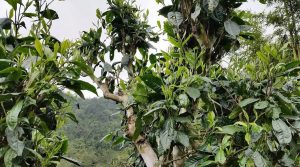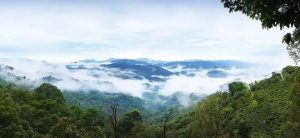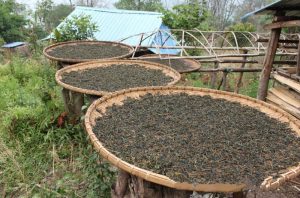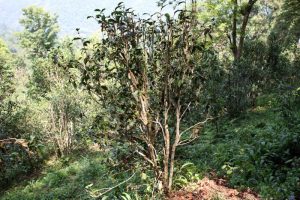
Yiwu Tea Mountain in Mengla County, Xishuangbanna

Chinese Name: 易武古茶山
Chinese Pinyin: Yi Wu Gu Cha Shan
English Name: Yiwu Tea Mountain
Keywords: Pu'er Tea, Ancient Tea-Horse Trail
Scenic Area: 878.2 square kilometers
Admission Fee: free
Opening Hours: All day
Location: Yiwu Village, Mengla County, Xishuangbanna,Yunnan, China
Yiwu,The Hometown of Pu’er Tea. Yiwu Town is situated in the north of Mengla County, Xishuangbanna Prefecture. It is the hometown of Pu’er Tea as well as the starting point of the Ancient Tea-Horse Trail (Road). In old times, Yiwu was known as a commercial city. It serves as the linkage between China and Laos and an important gateway to the Southeast Asia. The Yiwu name has picked up considerable steam and now carries significant sway in the pu’erh market. As a result, what is marketed as Yiwu tends to come from a very large area.
Why is Yiwu Mountain so special?
As the hometown of Pu’er Tea, Yiwu has conserved in good conditions historical relics of the “Ancient 6 Teas Mountains”. Strolling on the old streets of Yiwu, one will be greeted by time-honored trademarks of tea businesses such as Cheshun, Qianlizhen, Anle and Tongxing etc. Tea trees can be found in every mountain, and every village plants tea. This is exact appearance of Yiwu Tea Mountain.
Where is Yiwu Mountain?
Yiwu Tea Mountain is located in the north of Mangla County, Xishuangbanna Prefecture, Yunnan. Yiwu Mountain ioffers heavy fog, fertile land, warm and rainy, rich in heat and abundant rainfall, which are good for plantation of tea.
Main Tea Mountains and Villages in Yiwu Tea Mountain
When it comes to Yiwu, we often see descriptions such as “the birthplace of Pu’er tea,” “the queen of tea,” “a historical record of tea,” “the foremost among the Six Ancient Tea Mountains,” “the origin of tribute tea on the Tea Horse Road,” and “the destination for tea enthusiasts.”
Such high praise for Yiwu is not without reason. If you delve deeper into understanding and tasting Yiwu tea, you will come to know of its glorious past and experience its gentle yet assertive character, which is incredibly captivating!
The Foremost of the Six Ancient Tea Mountains—Yiwu Tea Region
The Yiwu Ancient Tea Mountain, located in Yiwu Township, Mengla County, Xishuangbanna, Yunnan Province, borders Laos to the east and is surrounded by the Yao region, Menglun, Xiangming, and Manla on the south, west, and north sides. It lies in the eastern part of the Six Ancient Tea Mountains. The term “Yiwu” in the Dai language means “the place where beautiful snakes reside.”
The Yiwu Ancient Tea Mountain covers an area of approximately 750 square kilometers, making it the largest among the Six Ancient Tea Mountains. It includes Yiwu Zhengshan, Mansa Tea Mountain, and Manla Tea Mountain. Due to its large area, it is referred to as the Yiwu Tea Region. Yiwu Tea Mountain is the largest in the Six Ancient Tea Mountains, with a saying that “Yiwu occupies one and a half of the Six Tea Mountains.”
One Yiwu Mountain, Half a History of Pu’er
Yiwu has a long history of tea cultivation. Legend has it that tea existed in Yiwu Tea Mountain during the Han Dynasty, and Kongming (Zhuge Liang) taught the methods of picking and drinking tea when he arrived, leading Yiwu people to call Kongming the “Tea Ancestor.” By the Tang Dynasty, various ethnic groups such as the Hani, Blang, Wa, and Yi were already living in Yiwu and cultivating tea. During the late Ming and early Qing Dynasties, Yiwu gained prominence, with its Pu’er tea being exported to Tibet, Southeast Asia, and other regions. To facilitate the transportation of tribute tea and large quantities of tea, goods, and people, the Tea Horse Road centered in Yiwu was established during the Daoguang era, radiating in all directions. During the peak tea production seasons, the number of people coming to buy and transport tea reached tens of thousands, making it a bustling hub of commerce and mule traffic.
As Pu’er tea has become more widely recognized and accepted, it has evolved into a healthy, fashionable, and elegant green beverage. Yiwu tea, with its unique flavor, has once again risen to the pinnacle of Pu’er tea.
The historical influence of Yiwu tea is profound, and it is regarded as the destination for tea enthusiasts. Many tea connoisseurs enjoy tasting and collecting Yiwu tea, finding a sense of belonging in its unique flavor during their search.
The “Queen” of Pu’er—Yiwu Tea
We often hear “Ban Zhang is the king, Yiwu is the queen.” But did you know that “queen” comes first and “king” comes later? When Ban Zhang tea was still relatively unknown, Yiwu tea was already mentioned in Lu Yu’s “The Classic of Tea,” and the Six Ancient Tea Mountains were thus well-known. This highlights the significant reputation of Yiwu tea!
While Ban Zhang tea is known for its bold flavor like a domineering king, Yiwu tea is known for its delicate taste, like a gentle queen. In contrast, Yiwu tea is softer and less domineering, with very low bitterness and high sweetness. The tea soup is very delicate, with a smooth and gentle texture, and features a refreshing and floral honey aroma. Especially after aging, the tea has a flavor that lingers pleasantly.
The taste and aroma of Yiwu tea are closely related to its ecological environment.
Yiwu Ancient Tea Mountain ranges from 656 to 2023 meters in altitude, with significant elevation differences. It belongs to the northern tropical humid monsoon climate, characterized by warm and moist conditions. The high mountains are often shrouded in mist, and the land is fertile with abundant rainfall.
The soil in the tea region mainly consists of red soil and yellow soil. This unique acidic soil quickly accumulates nutrients and facilitates rapid decomposition and utilization, with high organic matter content. The ancient tea tree distribution area has well-preserved vegetation and high forest cover, creating an excellent ecological environment unmatched by other tea regions.
Yiwu’s “Seven Villages and Eight Hamlets”
Seven Villages:七村:麻黑村、高山村、落水洞村、曼秀村、三合社村、易比村、张家湾村;
- Mahei Village
- Gaoshan Village
- Luoshui Cave Village
- Manxiu Village
- Sanheshe Village
- Yibi Village
- Zhangjiawan Village
Eight Hamlets:八寨:刮风寨、丁家寨(瑶族)、丁家寨(汉族)、旧庙寨、倮德寨、大寨、曼洒寨、新寨。
- Guafeng Hamlet
- Dingjia Hamlet (Yao ethnic group)
- Dingjia Hamlet (Han ethnic group)
- Jiuhmiao Hamlet
- Luode Hamlet
- Dazhai Hamlet
- Mansa Hamlet
- Xinzai Hamlet
While everyone knows about the tender and gentle taste of Yiwu tea, it is less known that each of Yiwu’s “Seven Villages and Eight Hamlets” has its own unique charm. To describe Yiwu tea solely with its tender and gentle characteristics would indeed be an understatement of its title as the queen of Pu’er tea!
Yiwu’s Seven Villages and Their Unique Qualities
Yiwu’s Seven Villages: Mahei Mahei is one of the oldest villages in Yiwu and is considered a benchmark for Yiwu tea due to its influence in the region. It has been famous since the Qing Dynasty for its tribute tea, and today it remains one of the largest and highest-yielding ancient tea garden areas in Yiwu.
Characteristics: Mahei tea features broad, dark green leaves with tight, well-formed, and glossy buds. It has a distinctive aroma and rich tea flavor. The tea soup is clear and bright, representing the Yiwu characteristic of “fragrant and soft.”
Yiwu’s Eight Hamlets: Guafeng Hamlet Guafeng Hamlet is a purely Yao ethnic village bordering Laos, located 31 kilometers from the township government, and is quite remote. It has the highest altitude among the Yiwu Seven Hamlets, averaging around 1700 meters, and is known for having the most well-preserved ancient tea trees.
Characteristics: The ancient tea trees in Guafeng Hamlet are distributed across about 50 square kilometers of pristine forest. The tea produced here is known for its sweet and rich honey aroma, strong and subtle tea flavor, deep throat aftertaste, and a full-bodied tea soup. Guafeng Hamlet’s ancient tree tea is considered a high-end Pu’er tea with top standards.
Yiwu Tea Region’s Newcomer: Bohetang Bohetang, located in the deep mountains of the Yiwu Mansa Tea Region, has an altitude of about 1800 meters. The tea trees here are scarce and extremely old, with unique and valuable qualities, making it a benchmark tea in Yiwu.
Origin of the Name: The name “Bohetang” is said to originate from the Yao ancestors who, while planting spices in the deep mountains, accidentally discovered a tea garden with naturally growing “mint,” thus naming it “Bohetang.”
Characteristics: Bohetang tea has long stems, thick and solid buds, with a rich and high-aroma fragrance. The tea soup is a vibrant golden color, smooth and mellow, with a delicate texture. It has a refreshing and sweet taste with a wild, thick, and slightly cool sensation, truly making it a gem among teas.
Characteristics of Yiwu Tea Mountain Pu-erh Tea
Yiwu Pu-erh tea, produced in the Yiwu Mountain area of Yunnan Province, China, is renowned as one of the finest Pu-erh teas and is celebrated with the title “King of Tea.” The high regard for Yiwu Pu-erh tea is closely tied to its unique taste characteristics. This article will explore the taste profile of Yiwu Pu-erh tea in detail, allowing you to experience the charm of this tea treasure.
Yiwu Pu-erh tea is typically shaped into cakes, with a dark, lustrous appearance and tightly rolled leaves. The tea liquor is deep red and bright. The taste characteristics of Yiwu Pu-erh tea are primarily reflected in the following aspects:
- Rich FlavorYiwu Pu-erh tea is known for its rich flavor. The tea liquor is full-bodied and has a strong aftertaste. This rich taste comes from various components in the tea leaves, such as polyphenols and amino acids. During tasting, you can experience the tea’s complex layers in your mouth, as if savoring the sediment of time and the vicissitudes of history.
- Unique AromaThe aroma of Yiwu Pu-erh tea is distinctive, with strong aged and woody notes. This aroma evokes the feeling of being in a dense forest, experiencing the freshness and tranquility of nature. As you drink, the aroma gradually emerges with the flow of the tea, creating an immersive experience.
- Sweet Aftertaste and SalivationYiwu Pu-erh tea is known for its prominent sweet aftertaste and salivation. After the tea enters the mouth, it quickly spreads, bringing a sweet sensation. Additionally, the salivation effect is noticeable, providing a sense of moisture and comfort in the mouth. This sweet aftertaste and salivation contribute to Yiwu Pu-erh tea’s excellent reputation among tea enthusiasts.
- High BrewabilityYiwu Pu-erh tea has a high brewability, typically allowing for more than ten infusions, or even more. During multiple infusions, the tea’s taste and aroma remain consistent. This high brewability makes Yiwu Pu-erh tea a great value, enabling you to fully enjoy its unique charm.
- Significant Health BenefitsYiwu Pu-erh tea not only offers a unique taste but also provides notable health benefits. It is rich in polyphenols, caffeine, and other substances that help lower blood lipids, aid weight loss, and offer antioxidant properties. Regular consumption of Yiwu Pu-erh tea not only satisfies the palate but also positively impacts overall health.
- Rich Historical and Cultural HeritageYiwu Pu-erh tea has a long history and deep cultural significance. It carries the historical weight of the ancient Tea Horse Road and witnesses the transmission and development of Pu-erh tea culture. Drinking Yiwu Pu-erh tea allows you to appreciate its unique taste characteristics and also savor the profound essence of Pu-erh tea culture.
In summary, Yiwu Pu-erh tea stands out in the Pu-erh tea world with its rich flavor, unique aroma, sweet aftertaste, high brewability, significant health benefits, and profound historical and cultural heritage. Tasting Yiwu Pu-erh tea is not only a sensory pleasure but also a spiritual experience, allowing you to enjoy the distinctive charm of Pu-erh tea culture.
How to Get to Yiwu Mountain?
Travelers can get to Mengla County at first, then change bus or take local motorbike to Yiwu Tea Mountain. It is also a good idea to cycle or hike to Yiwu Mountain.
Long-Distance Bus is an important way getting to Mengla County, which could be accessible from Kunming, Jinghong, Puer, Luang Prabang, etc. Here we list some of the bus information for your reference.
| Route | Departure Station | Departure Time |
| Kunming-Mengla | Kunming South Passenger Station(南部客运站) | 10:30, 19:00, 19:30, 18:00 |
| Kunming-Mengla | Kunming High-speed Rail South Passenger Center(昆明高铁南客运中心) | 11:00, 18:00, 20:00, 20:30, 21:30, 22:00, 22:40 |
| Kunming-Mengla | Kunming North Passenger Station(北部客运站) | 21:00 |
| Puer-Mengla | Puer High Speed Passenger Station(普洱高快客运站) | 07:00, 08:10, 09:10, 10:10, 12:50 |
| Jinghong-Mengla | Jinghong Passenger Station | 07:10, 08:00, 09:00, 10:00, 11:40 |
History of Yiwu Mountain

Historically, Yiwu is famous for being the center of distribution for tribute tea to be sent to the emperor. The six famous tea mountains produced mao cha where it would be collected and sent out to Beijing from Yiwu. This trade brought a large number of Han merchants (the principle Chinese ethnic group) to the area to trade tea (source). Some of the more famous examples of aged pu’erh (from the 1930s) also originated here. i.e. Fuyuanchang, Tongqin Hao and Songpin Hao.
From the 1940s until the 1990s, tea production shifted away from these regions to Menghai County where Menghai Tea Factory planted ground. During this period, tea that was produced was usually unceremoniously sold as raw mao cha to the larger factories.
When China began to open up to the west, many Taiwanese traders visited Yiwu hoping to find both tea production and more aged tea. They found neither, but ended up helping the locals to restart tea production. As a result, the greater Yiwu area has strong ties with the Taiwanese market. Many of the Taiwanese pu’erh brands have strong ties to this region. This is covered far more thoroughly in Zhang Jinghong’s Ancient Caravans and Urban Chic.
In Zhang’s book she characterizes the Taiwanese and Yiwu style as emphasizing the hand-made and traditional aspects of tea-making, a supposed contrast from the more production oriented Menghai County tea. Yiwu tea operations tend to be smaller, often family-oriented, whereas Menghai County is more densely populated with major operations, i.e. Menghai Tea Factory .

Main Attractions and Things to Do in Yiwu
1.Characteristic Taste
Yiwu is known for a distinctive softer, less punchy base with a long-lasting sweet aftertaste when compared with other pu’erh regions, i.e. Bulang/Banzhang. There are a number of growing regions within the greater Yiwu area, including the six famous tea mountains. These areas all represent Yiwu to some extent, although there will even be significant variation moving from one region to the next.
Note #1: Because Yiwu is a township and a county, it is ambiguous as to what exactly constitutes “Yiwu”. This has not stopped tea producers from constantly marketing and using the Yiwu name to sell tea.
2.Karst Sightseeing
Yiwu also is endowed with Karst sights some of which are Huashegongzhu Cave (Cave of Princess Snake), Nametiancaiyun Cave (Colorful Clouds Cave) and Gaoshanluoshui Cave etc.
Snake Princess Cave
About 500 meters in the northeast of Yiwu, the Snake Princess Cave is in fact a dolomite. It’s known for the patriotic poems by Xu Ziheng, Li Shouchang and Dao Chengzhang all of whom were officials in the Qing Dynasty.

Nametiancaiyun Cave
More spectacular than the Snake Cave, Nametiancaiyun Cave is noted for stalagtites and stalagmites all of which are queerly shaped. It integrates natural and cultural sights, tropical rain forests and Karst caves, thus bringing forth picturesque sceneries.
3.Ethnic Minority
Yiwu is a multi-ethnic village, there are many ethnic live here together, such as Han, Yi ethnic, Dai ethnic, Yao ethnic, Hani ethnic.
Yi people are indigenous group of Yiwu village, which can date back to Han Dynasty. Diligent and kind Yi people keep a simple life style, work with sunrise and stop at sunset.
The Torch Festival is a traditional festival for the Yi ethnic group. It falls on the 24th of the sixth month of the Chinese calendar, and the celebration lasts for 3 days. The origin of the festival is related to ancestors’ worshipping of the fire, which is believed to have the power to repel insects, ward off evils, and protect the growth of crops. In some villages, it is a tradition for the elderly to pass down their farming experience to the younger generation during the festival.
During the festival, big torches are erected in the village, while small torches are placed in front of each household. When the night falls, an altar is set up and the holy flame is lit up. The Bimo (village flamen) will chant prayers, light up torches from the flame, and pass them to the villagers. Villagers, holding the flame, walk around the village, houses and the fields, and place the torches in the field corners to drive away evils. Inside the village, young men and women sing and dance around bir burning torches throughout the night.
Recommended Tours
3 Days XishuangBanna Tea Culture Tour to Yiwu and Nannuo Tea Mountains
6 Days XishuangBanna Yiwu Mountain Tea Culture Hiking Tour
11 Days XishuangBanna and Puer Ancient Tea Culture Tour with Yiwu Mountain Tea Plantation
Nearby Attractions
Menglun Tropical Botanical Garden
Xishuangbanna Tropical Botanical Garden (Chinese name: 西双版纳热带植物园) was built in 1959, is the biggest and richest botanical garden in China nowadays. Since 1996, this garden combined with former Kunming Ecological Research Institute, formed an independent research institution attached to Chinese Academy of Science. With the time goes by, it becomes a comprehensive garden that combined research, preservation and education of tropical plants together.
Wangtianshu Scenic Attraction is the only oasis at 21 degrees north latitude, and has been recognized internationally as China’s unique tropical rainforest. What is the most impressive in the park are the towering Shorea chinensis (Sky Trees) that are the rainforest iconic images in South and Southeast Asia. An Air Corridor (Kong Zhong Zou Lang), 2500 meters long and 36 meters high, has been built on the high canopies. It remains a challenge to both visitors and scientists. The well-protected tropical rainforest that was discovered by the Chinese reputed botanist Mr. Cai Xitao (1911-1981) and witnessed by Prince Philip of the UK, surprised many people when it was unveiled to the outside world. With hotels and air corridor, you can travel and lodge here.

Best Time to Visit
Belonging to tropical rainforest climate, Xishuangbanna’s dry season is from November to April the next year and rainy season is from May to October. With annual average temperature of 21 c, it has long summer and no winter. With cool and pleasant four seasons, the best time for traveling Xishuangbanna is from October to June the next year.
Useful Travel Tips
Local Cuisine
During your visit to Yiwu, you definitely shouldn’t miss the local cuisine. Yiwu boasts a unique culinary culture with a variety of dishes and distinctive flavors. You can enjoy authentic Yunnan cuisine and ethnic specialties in local restaurants, such as: cured pork ribs, wild mushrooms, and Dai-style sour and spicy fish. Additionally, Yiwu’s tea is also a highlight; you can sample local Pu-erh tea, green tea, and other delicious varieties.
Shopping Recommendations
While in Yiwu, you can also purchase local handicrafts and specialty products as souvenirs or gifts. Yiwu is known for its exquisite embroidery and weaving crafts, such as handmade embroidered shoes and embroidered scarves. Local tea and tea utensils are also great choices. When shopping, it is advisable to choose reputable merchants to avoid low-quality or counterfeit products.
Important Tips
- Safety Concerns: During your travels, be mindful of personal and property safety. Avoid going to undeveloped or unsafe areas to prevent potential dangers. Exercise caution when walking in mountainous or steep areas.
- Environmental Awareness: Protecting the environment is the responsibility of every traveler. Follow local environmental protection regulations, avoid littering, and do not damage natural landscapes or cultural relics. Also, respect local customs and cultural traditions.
- Respect Local Residents: Be considerate of the local residents’ lifestyles and habits. Try not to disturb their daily lives and respect their work and cultural traditions. When taking photos, always ask for permission from local residents first.
- Travel Planning: Given Yiwu’s limited transportation options, it’s recommended to plan your itinerary in advance and allow enough time to explore various attractions. Also, pay attention to the pace of your itinerary and avoid overexertion.

 7 Days GolfingTour
7 Days GolfingTour
 8 Days Group Tour
8 Days Group Tour
 8 Days Yunnan Tour
8 Days Yunnan Tour
 7 Days Shangri La Hiking
7 Days Shangri La Hiking
 11 Days Yunnan Tour
11 Days Yunnan Tour
 6 Days Yuanyang Terraces
6 Days Yuanyang Terraces
 11 Days Yunnan Tour
11 Days Yunnan Tour
 8 Days South Yunnan
8 Days South Yunnan
 7 Days Tea Tour
7 Days Tea Tour
 8 Days Muslim Tour
8 Days Muslim Tour
 12 Days Self-Driving
12 Days Self-Driving
 4 Days Haba Climbing
4 Days Haba Climbing
 Tiger Leaping Gorge
Tiger Leaping Gorge
 Stone Forest
Stone Forest
 Yunnan-Tibet
Yunnan-Tibet
 Hani Rice Terraces
Hani Rice Terraces
 Kunming
Kunming
 Lijiang
Lijiang
 Shangri-la
Shangri-la
 Dali
Dali
 XishuangBanna
XishuangBanna
 Honghe
Honghe
 Kunming
Kunming
 Lijiang
Lijiang
 Shangri-la
Shangri-la
 Yuanyang Rice Terraces
Yuanyang Rice Terraces
 Nujiang
Nujiang
 XishuangBanna
XishuangBanna
 Spring City Golf
Spring City Golf
 Snow Mountain Golf
Snow Mountain Golf
 Stone Mountain Golf
Stone Mountain Golf

















